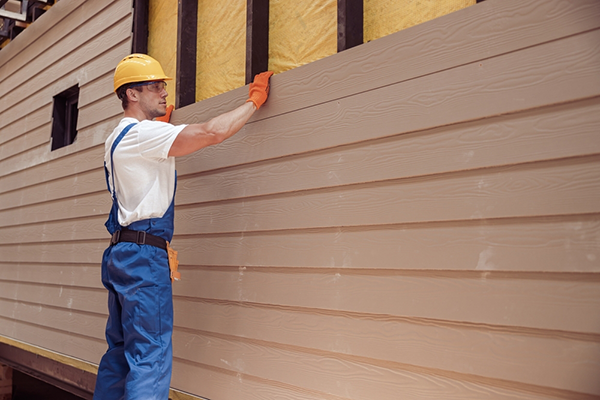Modern siding options: What materials to offer clients for your next project
Author: Lee Polevoi | June 26, 2025
Homeowners and business owners alike want the best modern siding options for their home or place of business. They rely on you to recommend the best choice among siding supplies, and contractors need to know current trends and what may lie ahead.

These days, many customers opt for siding materials that are durable and sustainable and that offer minimal environmental impact. Among the many siding supplies available, some stand out: fiber cement, engineered wood, vinyl, metal and composite. Each material protects a building's foundation from the elements, with some differences in performance, appearance, ease of installation and price.
Here's what you need to know about different modern siding options to provide the best choice for your customers.
Fiber cement
Fiber cement siding — composed of cement, sand and cellulose fibers — offers excellent sturdiness in different textures and colors. It holds up well against extreme weather conditions and requires little more than occasional cleaning with a pressure washer or garden hose.
At the same time, installation of fiber cement siding is fairly complex, so a roofing contractor's expertise plays a big factor in choosing this option. It's also more costly to install than other materials, though its durability is a big payoff for the time and investment needed.
Engineered wood
This composite material made from wood fibers and resin mimics the enduring appeal of traditional wood, but with greater protection from wind damage or other weather-related conditions. Its eco-friendly material is often attractive to homeowners — not to mention its relative savings when compared to the installation of traditional wood siding.
There are, however, potential issues in regions with high humidity. Moisture can cause siding to expand and contract, a potential source of long-term damage, and can lead to cracks in the resin coating. Costs for maintenance and repair must be considered with this option.
Vinyl
Vinyl, a plastic exterior siding, is a popular choice among homeowners. This sturdy material is often reasonably priced and available in a range of colors. Installation is easy, and because the color is baked in, vinyl doesn't need repainting.
On the other hand, if improperly installed, vinyl siding may fall prey to water trapped within a structure's walls. Vinyl siding can also develop cracks from hail impact, tree branches or other adverse conditions.
Metal
A durable material by its very nature, metal siding offers aesthetic appeal, low maintenance and enhanced protection against the elements. In warm climates, metal siding's reflective surface lessens heat absorption, thus contributing to lower energy costs. Metal siding can endure for decades and can be repainted to fit a homeowner's taste and area.
Keep in mind that metal siding installation is a more demanding process than with other siding materials. And, while metal siding is fire-resistant, extreme heat can cause crumpling or buckling. Anything that may impact the material (from hailstorms to falling branches) can result in unwelcome dents or scratches.
Composite
Similar to engineered wood, composite siding consists of differing materials, with significant curb appeal when properly installed. Installation is comparatively quick and easy, and doesn't require regular paint jobs. Also, little maintenance is needed. The risk of damage from rotting or pests is minimal, and the siding is available in a variety of colors.
Composite siding can be costly and time-consuming to install. Contractors should also warn clients about how the quality of composite siding can fluctuate between different manufacturers.
The best option for commercial structures
Commercial clients want siding that can last a long time, withstand harsh weather conditions and require little maintenance. The most commonly preferred commercial roof siding is metal (aluminum or steel) and, occasionally, traditional wood.
Aluminum siding's primary characteristics are its resilience and affordability. This lightweight alternative is good at resisting weathering and deterioration. Aluminum siding can remain strong for many years, though falling objects or hailstorms may cause scratches or dents.
Steel siding is considered even more durable than its aluminum alternative. There's little to no risk of fire damage, nor is it prone to rust or decay. This option is more desirable in regions where bad weather is a key factor, and though its price is somewhat higher than aluminum, this added cost is usually worth its strength over time.
The allure of traditional wood siding (redwood, cedar, etc.) lies in its aesthetic appeal. Its "natural" look — easy to custom-tailor with stains or paint — is attractive to business owners who value curb appeal as part of their model. But traditional wood siding is more prone than its metal counterparts to harm from water, insects and rot.
Your clients want options when it comes to choosing the right siding for their structures. QXO offers a wide range of top-brand siding materials for every siding project, both residential and commercial.